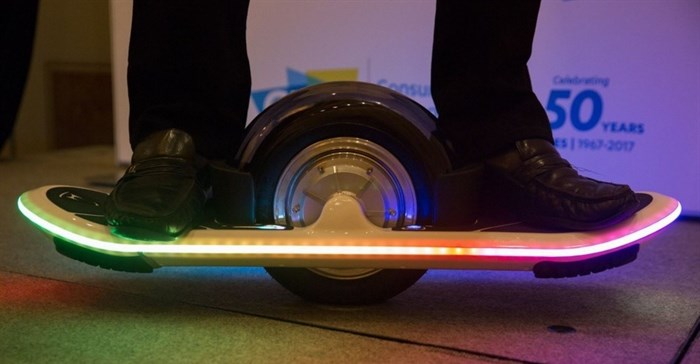Hoverboards make comeback at Vegas electronics show

These personal transport gizmos made a splash at the show two years ago and were hot holiday items in 2015 before a series of battery fires and injuries prompted bans in the US and elsewhere.
Last year, US marshals seized several lots of hoverboards before the show over concerns about unsafe batteries which could explode. But Hoverboard Technologies founder Robert Bigler, unfazed by the controversy, on Friday unveiled his single-wheeled GeoBlade, proclaiming it to be the future of personal urban mobility.
"It's so much like surfing on land," he said. "It's going to be like a bicycle."
He said the single-wheeled board is harder to master but offers advantages to those using two wheels, because it has a narrower stance and allows the rider to navigate more easily. It will have a range of about 16 kilometres and a maximum speed of 25 kilometres per hour.
Bigler said the GeoBlade will go on sale in March for around $1,500 - more expensive than many of those sold during the 2015 craze, but with higher quality components.
"It's going to take some time to win back public trust," he acknowledged.
Other similar devices were also on display at CES, including a new "off-road" hoverboard from California-based Swagtron, formerly Swagway. Swagtron vice president Robert Reeves said the T6 board is aimed at the adventure-minded.
"You can ride it on the sand, on the grass. It has air in the tires so you have more stability," he said.
Reeves said the Swagtrons never suffered from safety issues because of its sealed battery case, but agreed to a "voluntary recall" last year amid concerns over other brands of hoverboards. Still, he said the company is selling more than ever.
"The public image was tainted for about six months," he said, while citing genuine interest.
"It's gone from being a toy to a personal transportation mode."
The T6, which has a range of about 20 hours and a top speed of 20 kilometres per hour, will be sold for around $500 in the US market. It joins a lineup of smaller hoverboards from Swagtron, which is also planning to release a single-wheeled board and another which looks like a skateboard and has two small wheels.
One-wheeled boards were unveiled by FutureMotion and Segway, the inventor of one of the first personal transporters and which is now owned by China's Ninebot, part of electronics group Xiaomi.
Segway also sells a two-wheeled board which has a steering column that allows users to direct it with their knees. Segway's Gerry White said sales of these transporters - which he says are not hoverboards - have remained strong despite the woes of other brands.
"This segment has gone crazy," he said, adding that the Segway devices "are far superior to hoverboards".
Source: AFP






















